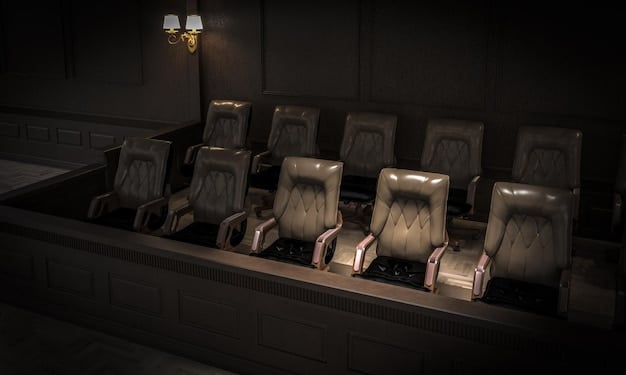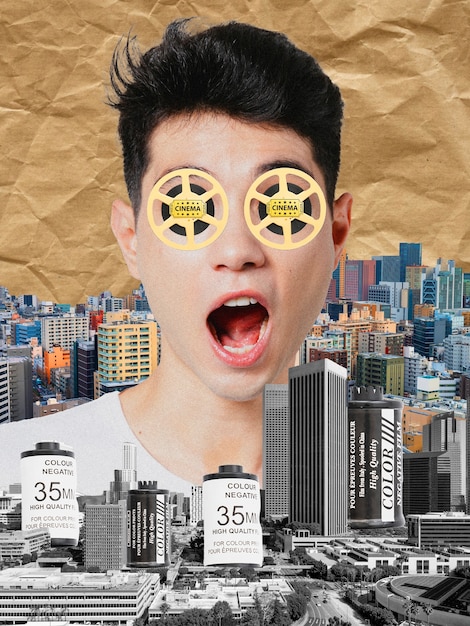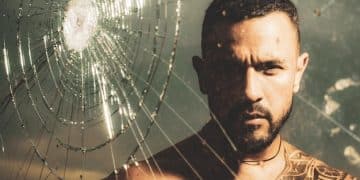Film Industry Copyright Lawsuit: How It Could Change Movie Making

Film Industry Faces New Copyright Lawsuit – Could This Change How Movies Are Made? The film industry is grappling with a significant copyright lawsuit that has the potential to reshape how movies are conceived, produced, and distributed, potentially impacting creators and consumers alike.
The film industry is no stranger to legal battles, but a new film industry faces new copyright lawsuit – could this change how movies are made? This legal challenge could have far-reaching consequences for how creative content is developed, protected, and shared in the digital age.
Film Industry Faces New Copyright Lawsuit
The film industry is built on intellectual property, and copyright law is fundamental to its functioning. Copyright protects original works of authorship, including movies, scripts, music, and other creative elements. Recent lawsuits are testing the boundaries of these protections in the face of evolving technologies and distribution methods.
These legal battles raise questions about the balance between protecting creators’ rights and fostering innovation. The outcomes of these cases could potentially reshape business models, influence creative choices, and affect how consumers access films.

Key Aspects of Copyright Law in Filmmaking
Copyright law is a complex and multifaceted body of legislation. Filmmakers and content creators regularly deal with issues related to copyright in their daily work. Here are some of the key aspects of copyright law that are most relevant to filmmaking:
Understanding Copyright Ownership
Copyright initially belongs to the author or creator of the work. This can include the writer, director, or production company, depending on the agreements in place. Understanding who owns the copyright is crucial for licensing and distribution.
Fair Use Doctrine
The fair use doctrine allows limited use of copyrighted material without permission for purposes such as criticism, commentary, news reporting, teaching, scholarship, and research. Determining whether a particular use qualifies as fair use can be complex and often depends on a case-by-case analysis.
Copyright Infringement
Copyright infringement occurs when someone uses copyrighted material without permission. This can include unauthorized copying, distribution, or adaptation of a film. Infringement can lead to legal action and significant financial penalties.
- Licensing: Obtaining the necessary licenses for music, footage, or other copyrighted material used in a film.
- Public Domain: Using works that are no longer protected by copyright and are free for anyone to use.
- Creative Commons: Utilizing works that are available under Creative Commons licenses, which allow certain uses with attribution.
Navigating these copyright issues requires filmmakers to be diligent in clearing rights, understanding the scope of fair use, and avoiding infringement. It also highlights the need for ongoing legal guidance to adapt to evolving interpretations of copyright law.
How Copyright Lawsuits Affect Movie Production
Copyright lawsuits can significantly alter the landscape of movie production. From pre-production to distribution, the threat of legal action influences decision-making processes, creative choices, and financial investments. These lawsuits often raise complex questions about originality, ownership, and the scope of copyright protection.
One of the most immediate impacts of copyright lawsuits is the increased scrutiny of scripts and story ideas. Studios and production companies are now more cautious about potential similarities to existing works. This heightened awareness can lead to delays in production, as legal teams carefully review projects to mitigate risks.

Creative Constraints
Filmmakers may face creative constraints as they attempt to avoid potential copyright issues. This can involve altering plotlines, changing character names, or omitting scenes that are deemed too similar to copyrighted material. The result can be a compromise in the artistic vision of the film.
Financial Implications
The financial implications of copyright lawsuits can be substantial. Defending against a lawsuit can cost millions of dollars, regardless of the outcome. Production companies may also be required to secure additional insurance coverage to protect against copyright claims. This added financial burden can make it more challenging for independent filmmakers to secure funding for their projects.
In some cases, copyright lawsuits can halt production altogether. If a court issues an injunction, filming may be suspended until the legal issues are resolved. This can lead to significant delays and increased costs, potentially derailing the entire project.
- Due Diligence: Production companies are conducting more thorough due diligence before starting production, including comprehensive copyright searches and legal reviews.
- Insurance: Insurers are offering specialized coverage to protect against copyright claims, but premiums are rising as the risk of lawsuits increases.
- Alternative Dispute Resolution: Some filmmakers are turning to mediation or arbitration to resolve copyright disputes more quickly and cost-effectively.
Overall, copyright lawsuits have made movie production a more complex and risk-averse endeavor. Filmmakers must navigate a legal minefield to bring their creative visions to the screen, balancing artistic expression with the need to protect against potential legal challenges.
Notable Copyright Lawsuits in Film History
Several high-profile copyright lawsuits have left a lasting impact on the film industry, shaping how studios and creators approach intellectual property. These cases serve as cautionary tales, highlighting the importance of securing rights and differentiating original works from existing material.
“The Matrix” and “The Invisibles”
One notable case involved allegations that “The Matrix” borrowed heavily from Grant Morrison’s comic book series, “The Invisibles.” While the lawsuit was ultimately dismissed, it raised important questions about the boundaries of inspiration and originality in filmmaking.
“Avatar” and “Hulk”
James Cameron’s “Avatar” also faced copyright claims, with some alleging similarities to existing science fiction stories and artwork. Although these claims did not result in a successful lawsuit, they underscore the challenges of creating truly original content in a genre with a rich history.
These cases demonstrate the difficulty of proving copyright infringement, as courts often require evidence of direct copying or substantial similarity. However, even unsuccessful lawsuits can have a chilling effect on creativity, leading filmmakers to be more cautious about potential legal challenges.
- Increased Legal Scrutiny: Studios are now more diligent in reviewing scripts and story ideas to identify potential copyright issues.
- Risk Management: Production companies are implementing risk management strategies to minimize the likelihood of copyright lawsuits.
- Creative Compromises: Filmmakers may be willing to make creative compromises to avoid potential legal challenges.
These landmark cases have reshaped the legal landscape for filmmakers, emphasizing the need for vigilance, creativity, and respect for intellectual property rights. They also serve as reminders of the ongoing tension between protecting creators’ rights and fostering innovation in the film industry.
The Role of AI in Copyright Disputes
The rise of artificial intelligence presents new challenges for copyright law in filmmaking. AI tools are increasingly used to generate scripts, create visual effects, and even compose music. This raises questions about authorship, ownership, and the potential for AI to infringe on existing copyrights.
One of the key challenges is determining who owns the copyright to AI-generated content. Is it the programmer who created the AI algorithm, the user who provided the input, or the AI itself? Courts are still grappling with these questions, and there is no clear legal framework in place.
AI-Generated Content and Copyright Infringement
AI-generated content also raises concerns about copyright infringement. If an AI is trained on copyrighted material, it may inadvertently reproduce elements of those works in its output. This could lead to lawsuits against the AI’s creators or users.
Ethical Considerations
Beyond the legal issues, there are also ethical considerations surrounding the use of AI in filmmaking. Some argue that AI-generated content lacks originality and creativity, and that it could devalue the work of human artists. Others believe that AI can be a powerful tool for creativity, enabling filmmakers to explore new possibilities.
- Transparency: Being transparent about the use of AI in filmmaking and disclosing the sources of AI-generated content.
- Human Oversight: Ensuring that human artists and creators have oversight over AI-generated content to maintain quality and originality.
- Legal Framework: Developing a clear legal framework for AI-generated content to address issues of authorship, ownership, and infringement.
As AI technology continues to evolve, it is imperative that the film industry addresses these legal and ethical challenges. By developing clear guidelines and best practices, filmmakers can harness the power of AI while protecting the rights of creators and fostering innovation.
Future Implications for the Film Industry
The film industry is on the cusp of significant change. As technology advances and legal landscapes evolve, the way movies are made, distributed, and consumed will continue to transform. Copyright lawsuits are playing a crucial role in shaping this future, forcing studios and creators to adapt to new realities.
One of the key trends is the increasing globalization of the film industry. As films reach wider audiences around the world, copyright issues become more complex. Different countries have different copyright laws, and it can be challenging to enforce rights across borders.
The Rise of Streaming Services
The rise of streaming services has also created new challenges for copyright law. Streaming platforms often license content from multiple sources, and it can be difficult to track and manage rights. Piracy remains a significant concern, as unauthorized copies of films are widely available online.
Increased Collaboration Between Creators and Tech Companies
As technology becomes more integrated into filmmaking, there will likely be increased collaboration between creators and tech companies. This could lead to new business models and creative opportunities, but it also raises questions about control and ownership.
- Technological Solutions: These involve using technology to track and manage copyrighted content, detect infringement, and enforce rights.
- Legal Reforms: Advocating for legal reforms that address the challenges of the digital age and protect the rights of creators.
- Industry Cooperation: Encouraging cooperation and collaboration among studios, creators, and tech companies to foster a more sustainable and equitable film industry.
Navigating Copyright Law in the Digital Age
In the digital age, navigating copyright law has become more complex than ever. The internet has made it easier to copy and distribute creative works, leading to a proliferation of copyright infringement. At the same time, new technologies have created new opportunities for creators to reach audiences and monetize their work.
One of the key challenges is finding a balance between protecting the rights of copyright holders and fostering innovation and creativity. Overly restrictive copyright laws can stifle creativity and limit access to information, while overly permissive laws can undermine the economic incentives for creating new works.
The Importance of Education
Education is essential for navigating copyright law in the digital age. Creators need to understand their rights and responsibilities, and consumers need to be aware of the legal and ethical implications of their actions. Schools, libraries, and other institutions can play a role in promoting copyright literacy.
The Future of Copyright Law
The future of copyright law is uncertain, but it is clear that change is needed. Many legal scholars and policymakers are calling for reforms to address the challenges of the digital age and ensure that copyright law continues to serve its intended purpose: to promote creativity and innovation for the benefit of society.
- Online Resources: Websites and databases that provide information about copyright law, licensing, and fair use.
- Legal Professionals: Attorneys and consultants who specialize in copyright law and can provide guidance and representation.
- Industry Associations: Organizations that advocate for the rights of creators and provide resources for navigating copyright issues.
| Key Point | Brief Description |
|---|---|
| 🎬 Copyright Lawsuits | Impact movie production by increasing script scrutiny. |
| ⚖️ Fair Use | Allows limited use of copyrighted material for commentary and criticism. |
| 🤖 AI-Generated Content | Presents new challenges in copyright ownership and infringement. |
| 🌐 Globalization | Increases complexity of copyright enforcement across borders. |
Frequently Asked Questions
▼
Copyright infringement refers to using copyrighted material without permission. This might include unauthorized copying, distributing, or adapting films, scripts, or other creative elements.
▼
Fair use allows the use of copyrighted content without permission for purposes like criticism, commentary, or news reporting. Documentaries often rely on fair use to incorporate existing footage.
▼
The ethical concerns include originality, potential devaluation of human artists’ work, and the need for transparency when AI-generated content is used in films.
▼
Filmmakers can protect their work by registering their copyright, using watermarks, monitoring unauthorized distribution, and consulting with legal professionals.
▼
The internet facilitates both copyright infringement through piracy and new distribution models. Streaming has complicated licensing, requiring vigilance for filmmakers to protect their work.
Conclusion
The film industry stands at a critical juncture, with copyright lawsuits and evolving technologies reshaping the landscape of movie production, distribution, and consumption. Navigating these challenges requires a comprehensive understanding of copyright law, a commitment to ethical practices, and a willingness to adapt to the ever-changing digital world.





